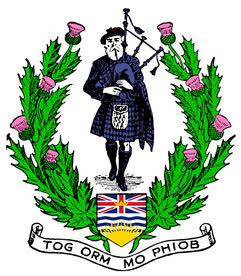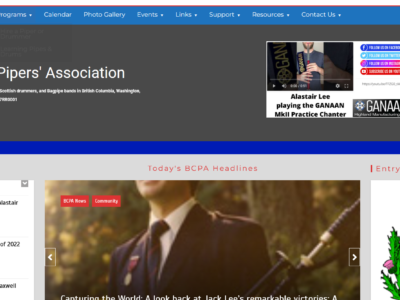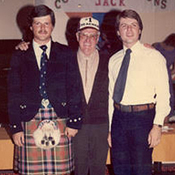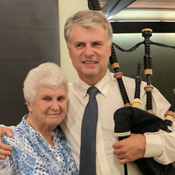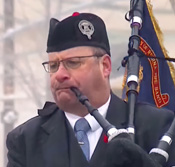PIOBAIREACHD CLUB
September 30, 2011
The first Club meeting of the fall was held at the home of Ron and Eileen Sutherland. It was well attended with newcomers, returning members and regular attendees.
Kyle Banta opened the meeting with MacKintosh’s Banner followed by Ed McIlwaine with “Lament for Alasdair Dearg MacDonell of Glengarry”. The composer of this tune is uncertain but it was possibly Padruig Mor MacCrimmon. Alasdair was the son of Donald Gruamach for whom “Lament for Donald of Laggan” was composed. Alasdair was the first of the Glengarry MacDonalds to spell his name MacDonell.
Jack Lee introduced the special guest and piper of the month, Allan MacDonald. Allan was raised in the Gaelic speaking community of Glenuig, Moidart, Scotland. Allan started piping at the age of nine. As a young piper he studied with many top instructors. During his career, Allan was extremely successful on the competitive boards, winning the gold medal and two clasps at Inverness. He found that in many ways the music played in competitions did not make sense to him – it was so different from the Gaelic songs, rhythms and idioms that he was used to hearing as he grew to manhood. For a music that was passed down for many generations by oral tradition, piobaireachd as played in the competitions did not seem to be immediately “catchy” or tuneful so that it could be memorized easily. Allan has spent many years researching the connection between piobaireachd and Gaelic songs and rhythms. He explained how he came to his conclusions about the music and reasons why it has evolved in the way that it has. Allan noted that in the early 19th century piobaireachd music began to be written down, and that as this progressed, it had the limiting effect of standardizing the playing of the ‘great music’ (cèol mòr). As a result, this free flowing poetically based art form began to lose its connection with the subtleties and nuances inherent in poetically based cèol mòr. In other words, the standardized playing of piobaireachd in competition gave birth to a style that has become homogeneous. Allan demonstrated with passages and tunes how the competition style differs from the “Gaelic music” style that he has adopted. He added that not all piobaireachd played would adhere to pace and phrasing of Gaelic music and that his analysis is a starting point for reexamination of the old music and how it might have been played. His approach to cadences and ornamentation is quite different, with less emphasis on long E’s. Allan played excerpts from tunes on his small pipe, and as he played he sang the Gaelic song on which the tunes were based. MacFarlane’s Gathering came through with such passion that in the mind’s eye one could join with the MacFarlane’s in their cattle raiding. Allan’s Lament for the Children gave voice to the keening of women.
After a tea and coffee break, Jack Lee played “War or Peace”. Thomas Budd followed with “The Groat”. A Groat was a silver coin gifted at the christening of the heir of a titled person or a Chieftain. Popular opinion suggests that this tune is attributed to Ian Odhar MacCrimmon in which case the heir would have either been William (XIIIth Chieftain born 1560) or John (XIVth Chieftain born 1580). As with all oral history, there is uncertainty. In any case, this tune celebrates new life.
The date of the next meeting will be revealed in the fullness of time. For information, contact Alex Galloway at alex_galloway@alumni.sfu.ca
